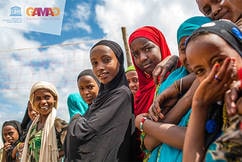October 28, 2015, published in UNESCO

Pupils participating in a physical education class at Tutis Primary School in Oromia State of Ethiopia, November 2013. © UNICEF Ethiopia
From 7 to 10 December, UNESCO and the Global Alliance on Media and Gender (GAMAG) will hold the first International Development Cooperation Meeting on Gender and Media and the first General Assembly of the Global Alliance on Media and Gender (GAMAG), in Geneva, Switzerland.
The events are co-hosted by the Republic of Lebanon and the Hellenic Republic (Greece) and supported by close to 20 UN organizations. Both events will coincide with the International Human Rights Day, December 10.
Women’s participation, their leadership and fair representation in media and technology are way below that of their male counterparts. After four decades of research and development actions, little change can be celebrated.
The world famous actor* Geena Davis observed that at the present rate, it will take another 70 years to achieve gender equality in the media. This is more than four times the number of years agreed upon by the international development community to achieve the new sustainable development goals, by 2030. A dialogue of a different order is needed.
Gender inequalities in the media and technology are rooted in cultures, traditions, stereotypes, beliefs and a lack of awareness of the negative gains of these inequalities on economic and sustainable development. Such social practices are no longer separated by remote geographical boundaries. Dialogue then becomes crucial to bring about a deeper understanding and agreement on a common path to change.
Therefore, the main aim of the high-level events is to initiate a dialogue about global development cooperation framework to achieve gender equality in and through media. The meeting will include various development actors such as UN agencies, funds and programmes, national and regional development organizations, governments, private sector and other international development organizations. Ministers, ambassadors, media, civil society, private sector, and development executives as well as leading experts are invited to attend.
Topics will include ingredients for global development cooperation framework on gender and media, the emerging online media and youth, gender and media as a business and development model, and strategic link between policy and research on gender and media.
To register for these events please click here:
GAMAG is a UNESCO-initiated groundbreaking partnership among over 800 media, civil society, academic, private and governmental organizations. Its purpose is to be the global mechanism through which Section J, gender and media, of the Beijing Declaration and Platform for Action (BDPA) can be systematically implemented and monitored. It is governed by 20 member organizations that form the international steering committee.
Before GAMAG there was no defined global framework for follow up on Section J of the BDPA. The twin events from 7-10 December 2015 will build on the global partnerships started through GAMAG. Yes We Must! Reaching Gender Equality by 2030.
Read the original article here.

Leave A Comment
You must be logged in to post a comment.